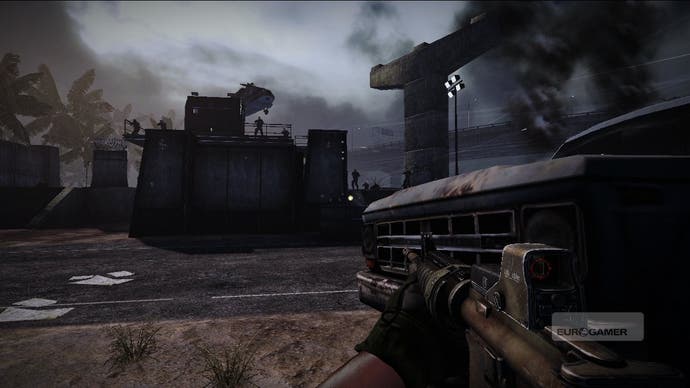MAG
Size matters.
Spawns work on set timers, so when you die you'll need to wait for the next wave of reinsertions, meaning there's more downtime after death than in most shooters. Your soldier's health doesn't auto-replenish, a perfectly valid design choice, but a nod to realism that feels at odds with the game's otherwise breezy style.
Friendly fire in a game of such dense population is initially a frustration, particularly as it can be difficult to separate friend from foe in the throng of battle. And without a kill cam, the irritation of being sniped from an unknown source will antagonise those who have been used to facing their killers in Modern Warfare 2 these past few months.
These shortcomings never fully disappear but you do soon acclimatise to the game's pace and approach and, once you stop focusing on the minutiae of the gunplay, a bigger, more impressive picture emerges. Zipper has borrowed the principles of Modern Warfare's superlative MMO-style meta-game so that every kill earns your character experience. At each level-up you earn skill points which can be spent on improving your abilities and hardware.
The character progression is well pitched and, once you're roped in, it's almost impossible to break loose. Unlike in Infinity Ward's games, graft in MAG offers more discernible rewards than merely bigger guns. Rather it is what's used to break the game community into a hierarchy, with those who have reached a high enough level able to assume leadership roles within a simple yet effective command structure.
It's here that MAG's brilliance is revealed. Each game is broken down into several smaller matches, all of which run concurrently on different, interlinked areas of the game map. Players are assigned to eight-man squads, four of which comprise a platoon of 32 players. Four platoons then make up each side of 128 players. If you've reached a high enough level you can apply to become a squadron leader and, if appointed the role for a match, you are free to designate objectives through a simple point-and-click interface.

Why should you want to follow 14-year-old Chad from Nebraska's orders? Because doing so will earn you bonus FRAGO (fragmentary orders) experience points, which are necessary to progress your own soldier's career. Obey orders and you'll level up faster. Moreover, squad and platoon leaders have special skills, such as health buffs, that will be active providing you keep close to them.
Want to play lone wolf? Fine. But the road to victory will be that much longer, and there's always the chance that your commanding office will get sick of your dissenting ass and boot you out the squad.
It's a brilliant piece of system design, as rewards for compliance are built into the game structure, removing any sense of bossiness from the squadron leader role yet adequately rewarding sides which work together. Additionally, while there's always one central objective, there are multiple ways to achieve it - giving those players who want to lead the chance to feel like their choices affect the outcome of a battle.

